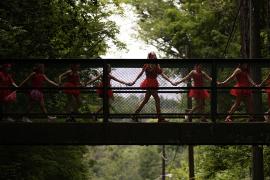Facial-recognition software is quickly becoming a mainstay in both the tech and consumer worlds. Among its capabilities, law enforcement and security personnel use it to track down criminals, social media uses it to tag posted photos automatically, and smartphone users unlock their phones and apps without the nuisance of having to type in a password or scan a fingerprint. And increasingly, camps are using facial-recognition software to identify and deliver photos of happy campers in the midst of their summertime fun for the benefit of curious and/or anxious parents at home.
But what are the implications for camps of using facial-recognition software? Here's a rundown of some of the benefits and concerns of using this technology.
Benefits
"Camps are happy because they're getting a lot of positive feedback from parents," said Rob Burns, president of Bunk1, a company that partners with summer camps across the US and Canada to offer families a simple way of staying connected with their campers.
"We've never gone to market to just sell facial recognition," Burns said. "It's a benefit of the bigger picture. What we're really selling is a parent engagement platform and the ability to make the parents feel like they know what's going on at camp and understand the value of the camp experience." Bunk1 reports more than 160,000 parents use its software every summer.
In 2019, Waldo Photos, another vendor of facial-recognition software services working with more than 150 camps in North America, found and delivered (via text to cell phones) 3,311,750 photos through their platform, according to the Waldo Photos company website (2020).
That's the crux of it: ease of use for both parents and camps, and peace of mind for parents.
The facial-recognition program is a user-friendly system. "A camp photographer uploads photos from a mobile app or desktop to our system and makes the photos live," explained Burns. "Our system automatically scans for matches and notifies parents when a photo of their child has been found. It all happens pretty instantly."
Parents of campers at camps using the Bunk1 facial-recognition platform have to opt in to the service and provide a photo of their child(ren) for matching purposes. "They receive push notifications of new photos of their children and we're asking the parents to confirm or deny if that's Johnny in the picture," said Burns. "This way, the company has statistics on accuracy directly from the parents."
"Camps are using the technology to more easily share all the photos that they were previously posting on Facebook or other online albums," said Lindsay Nash, director of content at Waldo Photos, in 2018 (Kay, 2018).
At CampGroup's Lake of the Woods and Greenwoods Camps, which serve around 1,250 campers each summer and where use of facial-recognition software to identify camper photos is provided as an optional service, "not one family has expressed concern" about its use, said Dayna Hardin, president of CampGroup.
"We all know that many parents wait anxiously for the daily photos to be posted from camp," Hardin said. "We wanted to give parents an easier way to see their child(ren) at camp. Prior to facial recognition, parents had to scroll through 300–500 photos a day in hopes of seeing a photo of their child. There is nothing more fun than receiving photos pushed to your cell phone of your child while he/she is away at camp. And the campers were not impacted by this change [to using a facial-recognition platform] because there was no difference in how we took daily photos of them."
Hardin said her organization also wanted to be able to keep track daily of how many photos each camper appeared in. The software's administrative app allows camps to see how many photos they've uploaded of each camper, so they can make sure they have an appropriate number of every child attending.
This ability to ensure multiple photographs of each child at camp also means regular communication with parents. Said Burns, "Open rates on email are very low these days. This gives camps an opportunity to engage with parents in a different way."
Concerns
Washington Post reporter Drew Harwell wrote in August of 2019 that "No national law regulates facial-recognition software. But Federal Trade Commission regulators said . . . they were considering updates to the country's online child privacy rules that would designate kids' faces, among other biometric data, as ‘personal information' protected under federal law." That same month, the US Court of Appeals for the 9th Circuit ruled that Facebook users could sue the company for its use of facial-recognition technology to identify people in photos without their consent (Harwell, 2019).
Outside the camp world, "Consumers are increasingly concerned about how their data is being collected and used," Missouri Senator Roy Blunt said in a statement. "That's why we need guardrails to ensure that, as this technology continues to develop, it is implemented responsibly" (Birnbaum, 2019).
"Privacy advocates have raised the alarm on facial-recognition software over its ability to quickly identify people from a distance without their knowledge or consent — a power used increasingly by police and federal investigators to track down suspects or witnesses to a crime," Harwell wrote. Some cities in the US, including San Francisco, have banned the surveillance technology's use by public officials and police (Harwell, 2019).
Where camps are concerned, Harwell said, "The face-scanning technology also has sparked an existential tension at many camps: How do you give kids a safe place to develop their identity and independence, while also offering the constant monitoring that modern parents increasingly demand?"
Some child and adolescent therapists, including Katie Hurley, worry that this voyeuristic practice so many parents have adopted could be detrimental in the long run. "How can our kids ever learn to be autonomous when we're always tracking and monitoring them?" Hurley asked.
The constant peek allowed into their children's camp lives through facial-recognition software, though meant to calm parents' fears about their children's summertime experiences, can also have the opposite effect on some individuals. Harwell reported that "Liz Young, a longtime camp director . . . said she now fields as many concerned-parent calls in two hours as she used to get all month — mostly from parents asking how their kids look on camera or whether they're being photographed enough" (Harwell, 2019).
One final concern with facial-recognition software: misidentifications do happen, and such errors are increasingly being recognized as a civil rights issue. There is a growing concern that identification errors by these software programs occur "in part because the systems are trained on data sets that are themselves skewed," said Geoffrey Fowler, technology columnist for The Washington Post (Fowler, 2020).
"Accuracy disparities mean already marginalized communities face the brunt of misidentifications," said Joy Buolamwini, founder of the Algorithmic Justice League. "But the point isn't just that facial-recognition systems can misidentify faces, it's that the technology itself can be used in biased ways by governments or corporations" (Fowler, 2020) — or even camps if vigilance is not maintained.
Advice
Owners and leaders weighing the pros and cons of implementing facial-recognition technology at their camps and deciding to take the plunge should keep The Redwoods Group Senior Consultant Katie Johnson's advice in mind: "Since these are typically third-party vendors, our thought would be to vet/verify the security of the vendor through written agreements. The agreement should outline what the vendor can and can't do with the photos (storage, selling to another vendor, etc.) and who ultimately owns the photos. Camps should have legal counsel review the contract prior to signing to ensure their property (photos, videos) is protected."
References
- Birnbaum, E. (2019, March 14). Senators introduce bill to regulate facial recognition technology. The Hill. Retrieved from thehill.com/policy/technology/434166-bipartisan-senators-introduce-bill-to-regulate-facial-recognition
- Fowler, G. A. (2020, June 12). Black Lives Matter could change facial recognition forever — if Big Tech doesn't stand in the way. The Washington Post. Retrieved from washingtonpost.com/technology/2020/06/12/facial-recognition-ban/
- Harwell, D. (2019, August 8). As summer camps turn on facial recognition, parents demand: More smiles, please. The Washington Post. Retrieved from washingtonpost.com/technology/2019/08/08/summer-camps-turn-facial-recognition-parents-demand-more-smiles-please/
- Kay, M. (2018, July 30). Waldo, a facial recognition tool, wants to track your kids this summer. GearBrain. Retrieved from gearbrain.com/Waldo-camp-facial-recognition-software-2589892014.html
- Waldo. (2020). Hi, I'm Waldo. Retrieved from waldophotos.com/company.
Marcia Ellett is the Editor in Chief of Camping Magazine.



